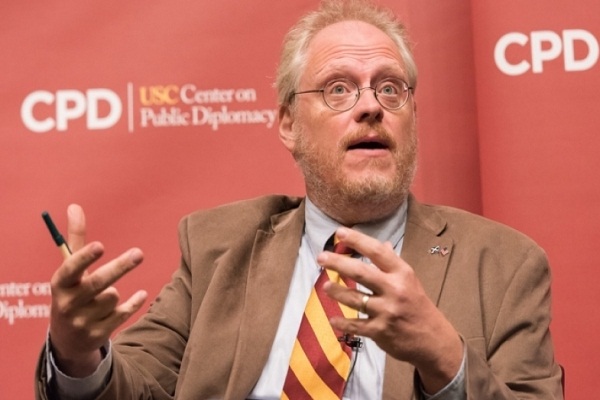Islam Increasingly Being Integrated into British Life: Scholar

“Contrary to the headlines about extremes on both sides I see Islam as increasingly integrated into British life and more and more Muslims playing leadership roles,” Nicholas Cull told IQNA in an interview.
“I’m thinking of British diplomats with Muslim backgrounds. There are Muslim celebrities and public intellectuals and all kinds of positive indicators that were not part of the Britain I knew growing up in the 1970s. I believe that these problems will diminish in their current form as prosperity returns, but I also know that societies must always be on their guard against racism,” he added.
Nicholas J. Cull is originally from the UK. His BA (International History and Politics) and PhD (History) were both from the University of Leeds. He also studied at Princeton as a Harkness Fellow of the Commonwealth Fund of New York. He taught at Birmingham University and at University of Leicester where, as one of the UK’s youngest full professors, he launched the Center on American Studies in 1997.
He currently is a global communication policy fellow at the Center for Communication Leadership and Policy, USC Annenberg School for Communication and Journalism.
Following is the text of the interview:
IQNA: After World War II and the defeat of Nazism and Fascism, far-right ideas seemed to have no place in European countries. But now we are witnessing an emergence of far-right groups and parties in European countries, including Britain. What is the root cause of this?
Cull: I don’t think these ideas ever went away. They are one of the political extremes that shows up in times of stress. World War Two made racism unfashionable for sure but it is still deeply rooted as an impulse in people. It was a resource for Hitler and other leaders before the war and it is still as resource for those mistaken enough to seek to tap it in our own time.
IQNA: What is the reason for the opposition of parties like BNP to foreigners and religious minorities such as Jews and Muslims?
Cull: Foolishly blaming an outside group like Jews or Muslims provides an enhanced sense of self and an explanation for how one’s own idealized group still encounters problems. These philosophies of hate arrive ready-made – off the peg – and it is not as if there is some re-invention which has happened with the re-emergence of these ideas. It is literally a mediaeval mentality.
IQNA: Some believe that anti-Semitism in Britain has given way to Islamophobia in recent years. How do you evaluate this issue?
Cull: I fear that both anti-Semitism and Islamophobia are alive and well. In fact, some left wingers in the UK have veered towards anti-Semitism as a way to show that they are personally are NOT Islamophobic. It has been a painful time for both British Jews and British Muslims.
IQNA: What causes people to turn to far-right groups and parties in Britain?
Cull: People long to (be) special and to feel part of something larger than themselves. I see Britain as still struggling to cope with the experience of the end of Empire and adjusting to being one of many Middle Powers in the world. There are long-standing narratives in the UK about Britain saving the world from fascism, faring best alone, and being too special to be part of collective projects like the European Union. It is ironic that the anti-fascist fight of World War Two can be integrated into a new fascism. Far right-thinking feeds on anger and provides a sense of belonging. One trend is towards younger and younger members in the far right which suggests specific needs in that demographic which is also where ‘Islamic’ extremists find their recruits.
IQNA: Why are some British-born Muslims drawn to extremist groups such as al-Qaeda or Daesh (ISIL or ISIS)?
Cull: Radicalization is often linked to the difficulties which British-born Muslims have had in assimilating in Britain: a rejection of their parents’ efforts to be both British and Muslim. The young are often attracted to purity and simplicity and the extremists of all sides know this. I am told that there are no examples of self-radicalization. Someone is always reaching out and offering the philosophy as an answer to the challenges of modern life.
IQNA: How do you think anti-Islamism can be fought?
Cull: Of course. But with both radicalizations of the far right and of the Islamic variety I recall the words of the Roman poet Ovid when he said: ‘In prosperity no altars smoke’ meaning that the impulse to extreme religious activity is linked to economic conditions. When people are prosperous, they are less interested in extremes and less malleable by people who shape dissatisfaction into an engine for their own advancement.
IQNA: How do you see the future of Muslims in Britain? What is the current status of Muslims in the country?
Cull: Contrary to the headlines about extremes on both sides I see Islam as increasingly integrated into British life and more and more Muslims playing leadership roles. I’m thinking of British diplomats with Muslim backgrounds. There are Muslim celebrities and public intellectuals and all kinds of positive indicators that were not part of the Britain I knew growing up in the 1970s. I believe that these problems will diminish in their current form as prosperity returns, but I also know that societies must always be on their guard against racism.
Interview by Mohammad Hassan Goodarzi
 Most Commented
Most Commented 


